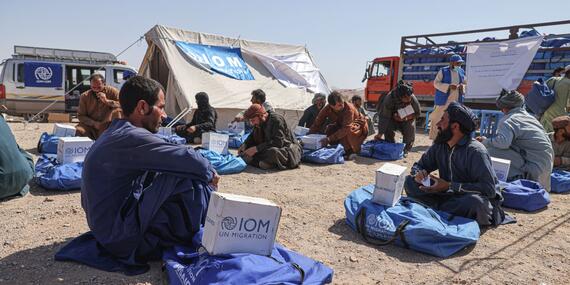Today's top news: Occupied Palestinian Territory, Afghanistan

Occupied Palestinian Territory
Mass displacement continues across Gaza. More 338,000 people are now displaced – this is an increase of 30 per cent since yesterday. More than 218,000 displaced people are sheltering in United Nations Relief and Works Agency for Palestine Refugees in the Near East (UNRWA) schools.
In Gaza, more than 2,500 housing units have been destroyed or severely damaged and rendered uninhabitable, and while another nearly 23,000 have sustained moderate to minor damage.
At least 88 education facilities have been struck, including 18 UNRWA schools, two of which were used as emergency shelters for displaced, as well as 70 Palestinian Authority schools. This means that for the sixth consecutive day, more than 600,000 children have had no access to education at a safe place in Gaza.
Gaza’s sole power plant ran out of fuel and has stopped functioning, leaving the Strip in a blackout.
Since the start of hostilities, seven significant water and sewage facilities serving more than one million people were hit by airstrikes and have been severely damaged. In some areas, sewage and solid waste are now accumulating in the streets, posing a health hazard.
Half of the bakeries have less than a week's supply of wheat flour, while 70 percent of shops report significantly decreased food stocks.
Humanitarian agencies continue to face major constraints in providing humanitarian assistance. The insecurity is preventing safe access to impacted areas and warehouses. Despite the challenging conditions, humanitarian workers have provided some assistance, including the distribution of fresh bread to 137,000 displaced people, the delivery of 70,000 litres of fuel to water and sanitation facilities, and the activation of psychosocial support helplines.
Yesterday, the Under-Secretary-General for Humanitarian Affairs, Martin Griffiths, allocated US$9 million from the Central Emergency Response Fund to urgently respond to relief efforts.
Afghanistan
We are continuing to assess the impact of the earthquake that hit the country yesterday.
As of yesterday, 1 person had been killed and an estimated 140 were injured by the second earthquake. Already, 17,000 people had been directly affected by first earthquake.
Damaged housing, plus the fear of returning home due to persistent aftershocks, have resulted in the several informal sites having sprouted across Herat City.
The response continues and our international colleagues are working with local partners to support affected communities.
The International Organization for Migration (IOM) distributed humanitarian aid to 930 families in the affected area and in sites in Herat city hosting families who have been displaced by the disaster. This includes shelter assistance to more than 700 families whose homes were completely destroyed by the earthquakes. IOM also provided four ambulances to the regional hospital in Herat City to transport injured people to the provincial hospital.
The UN Refugee Agency (UNHCR) distributed solar lamps and hygiene kits, among other critical supplies, and is working to ensure that people with disabilities, older people and households headed by women receive support tailored to them. UNHCR says plans are under way to deliver psychosocial support to help people affected by the earthquake overcome the trauma.
For its part, UNICEF distributed more than 500 blankets and tents for temporary health care, while the World Food Programme has dispatched more than 81 tons of food.
